All About Wisdom Tooth Extractions
The third set of molars, which usually occur between 17 and 25, are removed during wisdom tooth removal surgery. Our Easton PA Dentist explains that people have at least one impacted wisdom tooth, which means it can’t develop normally. You can avoid damaging the surrounding teeth and bones by having your wisdom teeth removed—either because an impaction has been discovered or because they have the potential to create problems.
Today on the blog, our dentist in Easton PA explains everything you need to know about wisdom tooth extractions.

What Is A Wisdom Tooth Extraction?
Wisdom tooth extraction surgery is usually done outpatient treatment by your dentist in Easton 18042 or oral surgeon.
If an examination and X-rays suggest that your wisdom teeth are impacted or may create dental difficulties in the future, Dr. Moghadam, the best dentist in Easton PA, will propose this procedure. Wisdom teeth are not present in everyone, although most people have one to four.
The surgeon will make an incision into the gums and extract the tooth in parts or whole. Next, you’ll be sedated. This could be with nitrous oxide (laughing gas) or intravenous (IV) sedation. Dr. Boals, emergency dentist Colorado Springs, explains that we determine this based on few things. For example, we’ll take into account your comfort level, the intricacy and quantity of extractions necessary.
The Reason for Wisdom Tooth Extraction Surgery
During routine checkups and using dental X-rays, your dentist will monitor the growth of your wisdom teeth. If they’ve been impacted or have the potential to produce difficulties, such as the following, they may explore eliminating them:
- Infection
- Tooth rotting is a common problem
- Damage to the teeth in the area
- Periodontal disease is a kind of gum disease that affects the
- Bone deterioration
- Loss of teeth
Even if you aren’t suffering any symptoms right now, your dentist may recommend wisdom tooth removal surgery to prevent issues from developing. Our friends over at 4th St Family Dentistry, dentist in St Pete, explains that with wisdom teeth, it can be challenging to maintain proper dental hygiene since they are in a location that is difficult to clean.
How to Get Ready For Wisdom Teeth Extractions
Before the operation, discuss any concerns you have with your surgeon. They can advise you on what to do in the days leading up to surgery and how to budget for recuperation time. They can also discuss the anesthetic that will be used and how you will feel following the procedure.
The cost of wisdom tooth extraction surgery is determined by the severity of the impaction and the number of teeth being removed. Check your benefits and cover with your dentist, surgeon, and insurance provider.
You may prepare for your healing by purchasing soft or liquid-based meals that are easier to consume following surgery. Smoothies, applesauce, oats, yogurt, and other simple foods to eat without chewing might be among them.
Food & Beverage
Before surgery, eat and drink according to your surgeon’s instructions. Depending on the type of sedative utilized, the instructions may differ.
You won’t be permitted to eat or drink anything after midnight the night before the surgery if you have an intravenous anesthetic, so your stomach will be empty.
Medications
Medications including aspirin, Coumadin (warfarin), and Advil might raise the risk of bleeding disorders (ibuprofen).
Before having dental surgery, tell your doctor and dentist if you’re taking any of these or any other drugs. They’ll let you know if you can keep taking your existing drugs or whether (and when) you should stop to prepare for surgery.
For a consultation about your wisdom teeth extractions, contact College Hill Dental PA.









